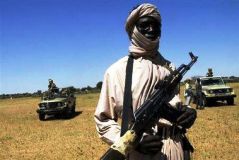Sudan, Darfur main rebel group agree to sign peace accord
May 5, 2006 (ABUJA) — Sudan’s government and the largest Darfur rebel group agreed Friday to sign a peace plan, a top U.S. envoy said, marking major progress in an internationally backed effort to end the death and destruction in western Sudan.
 U.S. Deputy Secretary of State Robert Zoellick indicated two smaller rebel groups that rejected the treaty could be bypassed, and his assessment was bolstered when one of the two split Friday, with dissenters criticizing their leader for not embracing the proposed treaty.
U.S. Deputy Secretary of State Robert Zoellick indicated two smaller rebel groups that rejected the treaty could be bypassed, and his assessment was bolstered when one of the two split Friday, with dissenters criticizing their leader for not embracing the proposed treaty.
“Today the largest group, Minni Minnawi’s, has agreed to sign and the government of Sudan have agreed to sign as well,” Zoellick told The Associated Press. “Not all the movements are in accord, but we’re already getting phone calls that people with (rebel faction leader) Abdel Wahid (Nur) believe he has made a mistake.”
Both the rebel and government sides, fighting for three years, have repeatedly failed to live up to agreements struck over two years of negotiations in the Nigerian capital. A cease-fire they signed in 2004 is in tatters.
Government spokesman Abdulrahman Zuma was nonetheless buoyant Friday.
“The deal is peace,” he said. “I think that the victory today is for Sudan.”
Zoellick said implementing the agreement would be a challenge, but said he was looking ahead next to organizing a U.N. peacekeeping force for Darfur.
The Sudanese government initially rejected calls for U.N. peacekeepers to replace the thousands of African Union peacekeepers in Darfur now, but had indicated it would yield if a peace treaty was signed. Zoellick said there was strong backing for a U.N. force among the mediators in Nigeria.
“The government has no reservation whatsoever about any U.N. involvement or participation after the signing of the peace agreement,” government spokesman Zuma said Friday. “The United Nations is the only party that could help us, really, in implementing this peace agreement.”
The peace deal calls for a cease-fire; disarmament of militias linked to the government and accused of some of the war’s worst atrocities; the integration of thousands of rebel fighters into Sudan’s armed forces; and a protection force for civilians in the immediate aftermath of the war. Political provisions include guarantees rebel factions will have the majority in Darfur’s three state legislatures, but the rebels didn’t get the national vice presidency they had sought.
Minnawi spokesman Saifaldin Haroun said the faction still had concerns about power sharing, but was no longer insisting Sudan have a vice president from Darfur. The other factions were holding out over concerns security and compensation for war victims had not been guaranteed and because the called for a top presidential adviser from Darfur instead of a vice president.
The Nur faction walked out of negotiations in the Nigerian capital before dawn Friday, as had another rebel group, the Justice and Equality Movement.
“Unfortunately, the draft does not fulfill the ambitions of the people of Darfur,” JEM negotiator Ahmed Tugod told the Arab satellite TV station Al-Arabiya. “This deal cannot produce logical results that lead to solving the Darfur issue. We are against partial solutions.”
But one of Nur’s top negotiators, Abdulrahman Moussa, said he was walking out on Nur to form his own Front for Liberation and Renaissance. He said was taking half Nur’s camp with him and they supported the peace agreement.
Nur “is not compromising and I don’t think he is seeking peace, especially after the generous offer from Zoellick,” Moussa said.
He said because his group was new, it might not have status to formally sign the peace agreement, but that the African Union and the international community “will acknowledge our will for peace and then we will find a way to negotiate with the government.”
Sudan’s government agreed days ago to an initial proposal drafted by African Union mediators and has been flexible as U.S. and British officials tried to fine-tune it to address rebel concerns. Members of the fractious rebel camp are united in accusing the central government of neglecting their impoverished region, but divided because of leadership rivalries and differing approaches.
Envoys from the African Union, the U.S., the U.K., the European Union and the Arab League have been pushing for a resolution and talks continued Friday. Deadlines have been extended twice since Sunday and Thursday’s session went five hours beyond the midnight time limit.
At least 180,000 people have been killed and more than two million forced to flee their homes in what the U.N. has called one of the world’s worst humanitarian crisis.
The Darfur conflict, which erupted in February 2003, also has spilled into Chad and Central African Republic. The violence threatens to escalate: Osama bin Laden last week urged his followers to go to Sudan to fight a proposed U.N. presence.
(ST/AP)
